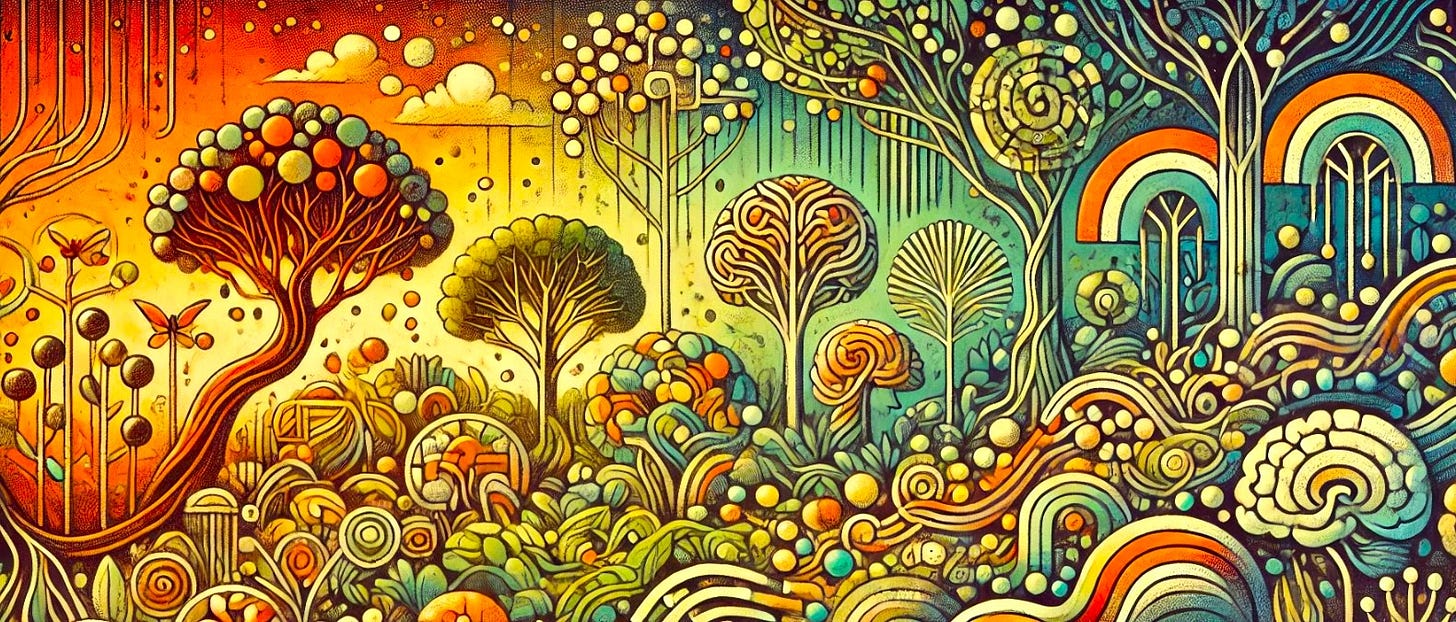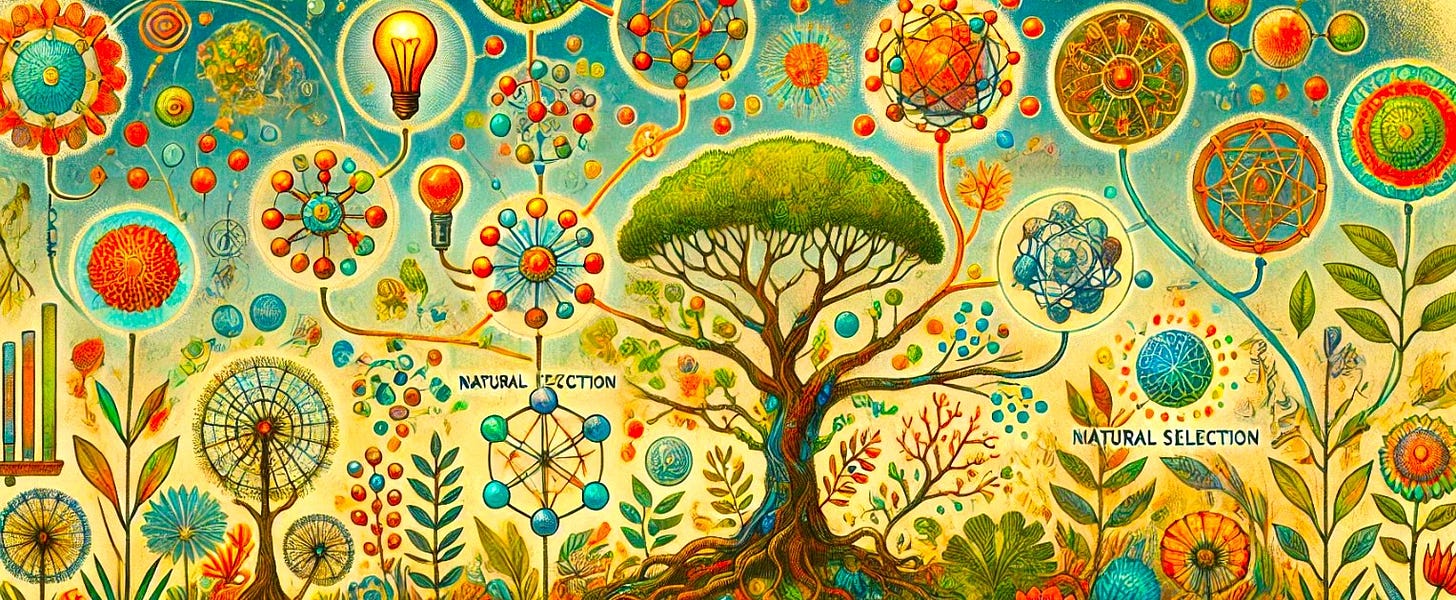I used to believe we needed a shared understanding of concepts such as truth or our highest beliefs, such as “God”.
I thought that this shared belief created societal harmony, ensuring we had the same or similar conceptions. But I don't believe this any longer.
I also don't believe in the alternative often presented, which is that we just shouldn’t (or can’t) believe in anything. People say that we no longer have any core values.
Cool… Okay… What if these aren't the only options?
The Natural Selection of Nonsense
There’s a group of educational theorists in Brazil who look at something called “ecologies of knowledge.” The idea here is interesting: instead of evaluating knowledge as simply true or false—where one epistemological system is correct, and another is incorrect—we should see epistemological systems of knowledge as species. It’s consonant with memes.
In other words, you don't ask in nature if the platypus is “correct.” No, the fact that it’s around means it’s valid (in some sense).
So, if someone believes in a conspiracy theory—like the Microsoft is run by lizard people—it should be viewed not just as incorrect but as an idea that occupies a niche, like a strain on an evolutionary tree. We should ask: what niche does this idea occupy? How does it interact with other knowledge systems to sustain itself?
Some map onto the world better than others, just like how some species last longer than others.
Thoughts Gone Wild
Generally, we say biodiversity is a “good”—it leads to more sustainable, complex systems that endure stress better than simple systems. Some go so far as to scientifically claim it as a good, which is odd because science generally makes amoral claims by nature of it being objective and scientists extol their ability to see morality as not being objective.
What if, when someone says “I believe in God” or “I believe in truth” that these words are meant to encompass the widest possible realm of existence? It’s as undefined as existence itself. What if, furthermore, this ambiguity isn't a weakness, but rather is the key to its strength?
When someone says they believe in God, perhaps it means something different to each of us. However, we find a niche under this broad category. That is, my understanding of God might be different from yours, but our expressions of belief harmonize because the idea is so vague. This vagueness allows each person to fit their interpretation into the larger picture.
The goal isn’t about believing in nothing. Instead, it’s about believing in the most ambiguous thing! Why? The most ambiguous allows the greatest possible evolutionary canvas for each of us to create our niches of knowledge and epistemologies. This amorphous category creates a colossal ecosystem, akin to the greatest biological diversity.
If in the same way that we should embrace complexity and stop demanding only watered-down explanations, then is there a case to be made for embracing ambiguity?
This is quite odd for me to write as someone who loves, reveres, and petitions for precise rigor in conversations. My background in mathematical physics has trained me that way.
But what if by embracing this ambiguity, we create the widest ecosystem of knowledge and, therefore, the greatest diversiform thoughts?
People dismiss the concept of “God” as polysemic… but what if this abundance of meaning is part of the point?
The Strategic Guide to Being Unsure
There's this famous phrase from rationalists: “I don’t even know what God means. It’s meaningless.” In some ways, I'm arguing for the opposite. It’s meaningful; it’s just that it’s full of virtually every sort of meaning!
Sure, divinity isn’t specific, but that doesn’t make it meaningless.
I used to think that only what can be explicated with lapidary stringency is meaningful but the amount of non-mathematical concepts we'd have to say are meaningless explode (what’s a chair? What’s a “you”?).
In other words, I used to think meaning had as a necessary condition specificity but I don't think this is the case any longer.
“God is the most ambiguous word.” one says as a dig. What I'm saying is “God” as a word or concept, has its ambiguity as its most evolutionarily favorable factor.
Why You Can't Put Everything Everywhere All At Once
By the way, I don't think that maximum diversity is always best. Why? Let’s take that to an extreme. Imagine a garden: if it’s all daffodils, it's not stable. But if we let it grow naturally with weeds, insects, and different plants, it's more diverse. Sure.
But what if you add a bear, and then every millimeter a different plant? What if you add a penguin? What about an ArXiv paper? There comes a point where adding multitudes becomes shambolic and unsustainable.
Oh, and there further comes a point where you pack in so much information you create a black hole! …Actually, you can write an ArXiv paper about that.
The point is that just “adding more diversity” isn’t necessarily “good”. One must balance and co-evolve for a system to be stable. For instance, how do you get a rainforest? It’s not stable from the start; it emerges given a certain environment, evolving and co-evolving, stabilizing across time.
Each species in a rainforest is continually adapting, eating into each other’s niches, being created, and being destroyed. Diversity requires co-evolution to create a harmonic and stable system, and if we impose some “principle of maximum diversity” then the mere addition of more and more creatures / flora would collapse it.
Some say even the addition of a single species (called humans) will destroy any environment.
However, in the context of ideas, the type of variegation I'm speaking about doesn’t mean throwing everything together in a conglomerate and expecting stability. Thus, some factor of time must be considered!
It's not just about what is the most dappled now but the argument is that what is longest lasting will have high “dappled-ness.”
The Genealogy of Shore Morals
This blew me away when I first realized it: generalist invasive species have a more difficult time surviving in rainforests than they do in monocultures. Do you know why?
It’s because the presence of multiple, specialized species outcompete a generalist invader.
Take crabs on the East and West Coasts of the US. An invasive crab species from China (Asian shore crab) took over the East Coast because it could dominate in both sandy and muddy environments. On the West Coast, there were two separate specialized crabs—one for sand, one for mud.
When the invasive crab arrived, it couldn't outcompete both specialized crabs working together in their respective niches. This is the kind of specialization and co-evolution that prevents invasive domination by a generalist.
The same applies to businesses. Sure, a generalist coffee shop may do well, but what if two specialized coffee shops cater specifically to different market segments? They can outcompete the generalist by effectively occupying their niches. Diversity, in this sense, makes it harder for new players—like invasive species or businesses—to dominate.
This principle can also be applied to YouTube channels or content creation. For Theories of Everything, I'm focusing on technically minded researchers and those in the public interested in moving beyond the analogies they heard in high school, to a graduate-level polymathic farago of physics, philosophy, consciousness, AI, and God. This is quite specialized.
A generalist channel might have broad appeal, but smaller, niche channels that focus intensely on a particular topic can collectively reach more viewers and create a stronger, specialized ecosystem of content. Evolutionary algorithms often show that, in the short term, specialists outperform generalists, but in the long term, generalists endure better due to adaptability.
The best systems are collections of specialists working in stable harmonic systems—like rainforests or universities. They form an "ecology of knowledge," where the collective resilience is greater than any individual part. A collection of specialists can often outlast and outperform even the best generalist because they are collectively adaptable to changes in their environment.
For individuals and businesses, being a generalist can work if they can’t become a specialist who harmonizes with others to create a superorganism—a larger, more adaptive system. The key is not to see oneself purely as a competitor but to find symbiotic relationships, forming alliances and creating a network that adapts and thrives.
Okay, cool… so there are evolutionary algorithms that apply to specialists and generalists. What are these algorithms and so what, Curt?
The View from Everywhere
In the immediate term, specialists tend to outdo generalists in getting a need.
Long-term, generalists win.
This is also exigent when talking about Theories of Everything. I'm not a researcher; I'm a learner. My goal is to learn every theory that's ever been theorized. I used to be embarrassed by the motley mix of interests and skills I developed, since in academia one must specialize.
However, what I've found is that those who are experts in string theory or loop quantum gravity or whatever it may be, will know more about a particular subject. What possible case can there be made of an advantage over such types?
It turns out, the specialists (at least in high energy physics) tend to not look across their shoulder, and certainly not across towns. That is to say, the loop quantum gravitist doesn't know the latest developments in string theory and vice versa, nor are they interested.
For myself, and likely you given you've read this far, the advantage is that we’re birds that fly over who know large swaths. We dive when necessary but remain aware of the nitty-gritty of adjacent disciplines.
Perhaps the un-defined divine is the greatest definition—an invasive species so perfectly adapted that “God” keeps every philosophical crab convinced they've caught the truth.
Perhaps we precisely need imprecision.
- Curt Jaimungal
PS: I’d like to thank my dear friend Peter Glinos for providing much of the insight in this post.











Another good one, I will be stealing/using "ecology of knowledge".
Nice TOE ep w Susskind also, thanks for the stuff
By definition, infinity cannot be quantified. We are a holographic fractal of the Divine infinite, co-creating the infinite cosmos.